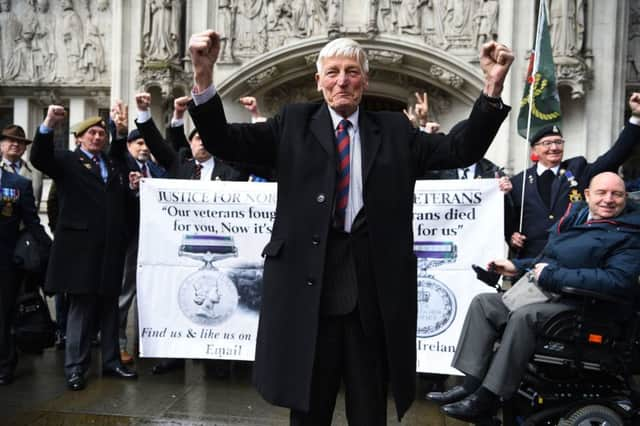Veteran Dennis Hutchings takes jury trial bid to Supreme Court


Dennis Hutchings, 77, a former member of the Life Guards regiment, is charged in relation to the fatal shooting of a man with learning difficulties.
John Pat Cunningham was killed in disputed circumstances in Co Armagh in June 1974.
Advertisement
Hide AdAdvertisement
Hide AdThe 27-year-old was shot in the back as he ran away from an Army patrol. His family contend that he ran across a field because he feared men in uniform.
More than 40 years on, a case was brought against Hutchings after Northern Ireland’s attorney general asked prosecutors to review the case.
Hutchings, from Cawsand in Cornwall, is due to stand trial in Belfast charged with attempted murder and attempted grievous bodily harm with intent. He denies the charges.
He has now gone to the Supreme Court in London to challenge a decision by prosecutors that his trial will be heard by a judge alone, rather than by a jury.
Advertisement
Hide AdAdvertisement
Hide AdSupporters from campaign group Justice for Northern Ireland Veterans clapped and cheered as Hutchings arrived at the court on Thursday morning.
Hutchings thanked his supporters and said: “Victory for veterans, that’s what we want.”
Speaking outside court, Hutchings said he was “a bit nervous, obviously, although I don’t think we will get a decision today”.
He said he was “reasonably confident” he would win his case, but added: “I just don’t trust the system anymore.”
Advertisement
Hide AdAdvertisement
Hide AdHutchings said: “The thing is whatever decision we get in here today affects every service person.
“If I win, for instance, they will then have a choice between having a judge-only trial and a jury trial; 99.9% of service people will want a jury trial.”
Pointing at the nearby Houses of Parliament, Hutchings added: “These people sent us there to do the job. Yes, things happened.
“They called it the Troubles because it’s easier to call it the Troubles. It wasn’t the bloody Troubles, it was a war, as simple as that.”
Advertisement
Hide AdAdvertisement
Hide AdHis barrister, James Lewis QC, told five Supreme Court justices that the principle of “procedural fairness” required Hutchings to be “afforded an opportunity to make representations” about whether to hold a non-jury trial.
Mr Lewis added that “in order to make meaningful representations, he needs a gist or summary of the material” considered by prosecutors.
The Director of Public Prosecutions for Northern Ireland can direct a defendant be tried by a judge alone, in what was formerly known as a Diplock court, where a charged offence was “committed to any extent ... as a result of, in connection with or in response to religious or political hostility”.
Prosecutors concluded that, in Hutchings’ case, there was “a risk that the administration of justice might be impaired if the trial were to be conducted with a jury”.
Advertisement
Hide AdAdvertisement
Hide AdBut Mr Lewis said the connection to “sectarian violence as required” by the law was “too remote”.
He added: “The offence must have occurred due to political or religious hostility (directly or indirectly) and that cannot apply to the security services who were there to uphold law and order and so were not engaging in any such acts (directly or indirectly).”
But Gerald Simpson QC, for the Director of Public Prosecutions for Northern Ireland, said in written submissions that the decision to direct a non-jury trial was “inconsistent with an obligation to allow representations to be made”.
He added that Hutchings’ contention that the shooting did not relate to “religious or political hostility” effectively “ignores the reality of the situation which prevailed in Northern Ireland in 1974”.
The Supreme Court has reserved its decision to a date to be fixed.